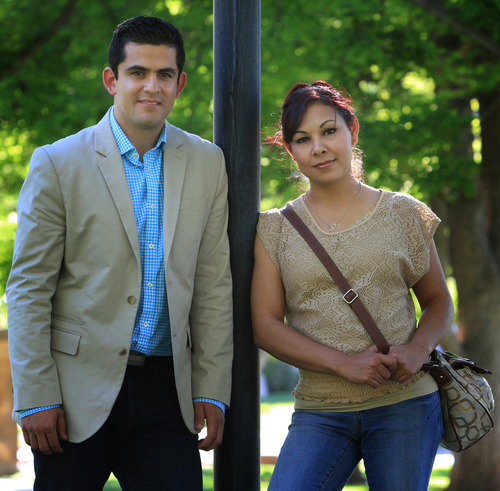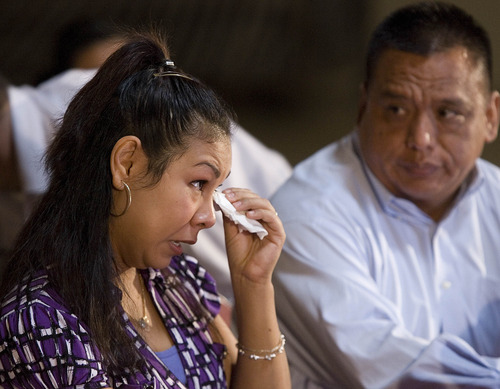This is an archived article that was published on sltrib.com in 2013, and information in the article may be outdated. It is provided only for personal research purposes and may not be reprinted.
Zoning in on the stars from his Chihuahua, Mexico, rooftop, Jesus Loya dreamed of graduating from a U.S. university to become an engineer.
Cooking and caring for her six younger siblings in Michoacan, Mexico, Silvia Salguero dreamed of a nonviolent future for her family, a proper education and starting a business in the States.
As undocumented immigrants navigating a curious culture, their paths would cross as outsiders inside the promise-filled corridors of Park City High School. Both teenagers trekked to the resort town in the mid-'90s — with no money and no English skills — lured by certain work in the surging economy.
Distinguished students upon graduation in 2000, Loya and Salguero soon emerged as trailblazing figures in a national debate that became the Dream Act.
Today — their friendship cemented by a crusading Spanish teacher, rejection by the Marines, and lobbying Sen. Orrin Hatch — they represent both ends of immigration's portent. One is an MBA working in venture capital — the other, struggling in the hotel service industry as a part-time student with three children.
On Monday — as the Senate tackles its Gang of Eight immigration bill in earnest — Loya and Salguero will be in Washington, D.C., to put a homegrown face on the broadest immigration-reform decision in more than a generation. They also hope to finish their fight.
—
Foreign dream • Salguero arrived in Utah on Christmas Day 1995 during a brutally cold winter. The family had no warm clothes or beds but found "tenement" housing near the top of Park City's Main Street. While her dad found sporadic work as a handyman, her mother cooked in restaurants, scarring her arms with boiling oil. Salguero cooked meals and cleaned alongside her four younger sisters and two younger brothers, none of whom spoke English.
"She became sort of a mother in the family — and in the middle of it, she had to do her homework," recalls Gerry Esplin, then a Park City High Spanish teacher, who became a mentor and close family friend. "She was very shy but she wanted to do the right stuff."
Terrified by the language barrier at 14 when he joined relatives living in Park City, Loya hated school and thought about moving back to Mexico after a month.
"Something else inside me told me to stay," he says.
Loya worked two jobs, advanced quickly after mastering the language, and graduated at 16. School suited him, but he had another goal: Loya wanted to join the Marines. Despite earning high marks, Loya was rejected because of his invalid Social Security number.
As a result, Loya, alongside his close friend Salguero, turned their focus to college.
—
Political will • Both Loya and Salguero notched strong grades in high school and Salguero earned multiple scholarships to the University of Utah. But when she went to pay her tuition — determined to become a nurse — Salguero was turned away: Undocumented and ineligible.
"I was horrified. I literally came unglued," says Esplin, who morphed overnight from high school teacher to political champion for Park City's undocumented Latino community.
"She said, 'Are you OK if we go for it? You might get deported,'" Salguero recounts. "I said, 'let's do it.'"
Advised by Fred Esplin, the U. vice president she later married, Esplin was initially told "this is going to take an act of Congress." Instead, she started locally, lobbying then-Summit County Rep. David Ure and Sen. Howard Stephenson, R-Draper. The result: HB144, which made Utah just the fourth state at the time to allow undocumented students to enroll in state colleges — paying in-state tuition — as in-state residents.
Stephenson was won over during a visit to Park City High. On the Senate floor, he likened the plight of Latino students to Rosa Parks as a bus load of undocumented teens from Park City looked on from the gallery.
"They were blown away," Esplin says, remembering the hugs following the vote. "They saw what the American system can do, and what it means if it's done right."
Salguero, noting out-of-state tuition is out of reach for most immigrants, says the legislation "changed a lot of lives — it was great."
Esplin didn't stop. She enlisted then-Gov. Mike Leavitt, university presidents in Utah, Catholic church leaders and a lawyer who had the ear of Sen. Orrin Hatch.
Moved by the plight of Salguero and Loya, Hatch — partnering with Illinois Sen. Dick Durbin — penned The Dream Act. It was put on ice based on the white-hot anti-immigrant rhetoric following 9-11.
—
Success and sacrifice • Working two jobs, Loya had saved $25,000, which paid the bulk of his electrical engineering program tab at the U. He took seven years to finish — dropping out to father a son — before completing the bachelor's degree in 2010 with honors. Within 21 months, Loya would earn a master's degree in electrical and computer engineering and his MBA. He also joined the Utah Entrepreneur Series and a development center that focuses on commercializing university projects.
"He planted a seed in me to continue my education and finish what I dreamed as a kid," Loya says about Hatch, "to be an engineer."
Now 29, the Salt Lake City resident manages a group of 74 private investors focused on start-up companies, and he consults entrepreneurs looking to grow their businesses.
Determined to be an example to her younger sisters, Salguero enrolled at the U. in 2003 before life interrupted. Her father, who was born in El Salvador, was deported. Then, she got pregnant.
"I had to help my mom with my six other siblings to pay their expenses," she explains. "I found a job as a house cleaner. I wanted to have a future but it makes it hard when you have to work low-skills jobs and try to support a family."
Over the years, she's been haunted by her nursing school dreams. "I thought, 'OK, I could study, but what could I do after without a Social Security number?'"
Now married with three children, 30-year-old Salguero is a part-time student at the U., hoping to complete a degree in business administration.
As so-called "DREAMers," under age 31, Salguero and Loya are part of the two-year deferred action program — meaning no threat of deportation — approved by the White House.
"They're both role models for the Park City Latino kids," Esplin says. "She's your model housewife mother, who is still trying to go to school. And he's this genius IT guy. They're just super, super good examples of what you can do if you work hard and you keep trying. And they did it."
—
Politics of the personal • Pulled into the crucible of a generation-long immigration debate, Loya and Salguero have quickly grown from shy foreigners to engaged activists.
Salguero is a member of the Salt Lake Dream Team, volunteers her time as a translator, and counsels teens interested in college. "By the time they get to be my age, I want them to be a professional," she says about undocumented Latinos. "And also to raise their voices. If everybody unites, it gives a face to what's happening — because we're out here. We're not leaving. This is our home."
Both have organized and spoken before Utah screenings of "The Dream is Now," a documentary funded by the widow of Steve Jobs chronicling the dreamers.
Loya — who has lobbied the Utah delegation in Washington on immigration reform — also is helping FWD.us, a group organized by Facebook owner Mark Zuckerberg, that promotes highly skilled immigrants for the tech industry. Hatch has fought for more high-tech visas as part of the Gang of Eight bill.
"I would love for him to come back to the Dream Act and finish what he started," Loya says about Hatch. "I'm sure I'm not the only one in this state who has taken the opportunity and made something big of themselves. He needs to know that what he did back in 2001 was incredible, and he needs to support it."
Hatch has neither made a concrete endorsement nor objection to Dream Act provisions, but acknowledges such elements are popular in public polls.
"It's going to take some real leadership," Hatch, speaking about overall immigration reform passage, told business leaders and Zions Bank customers at a downtown luncheon last month. "I'd like to support it, but I'm not there yet."
On Monday, Loya and Salguero have a Washington meeting with Hatch staffers to counter claims that undocumented immigrants drain taxpayer subsidized services. They will take that same message to immigration-reform groups across Utah and beyond — hoping their biography puts pressure on Congress to pass the bill.
"Immigration reform will be a chance for all of us because it's a way of earning our citizenship," Salguero says. "We have to earn it, and that's a big difference compared to amnesty."
Salguero and Loya know very little about the latter.
Twitter: @derekpjensen





